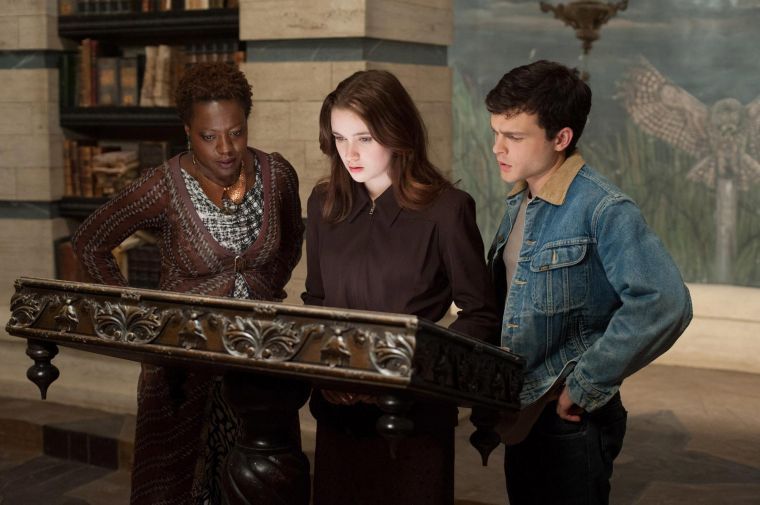
Had writer Richard LaGravenese (P.S., I Love You) chosen one genre of movie — humor, romance, horror — to focus on, his film might have been more poignant. In fact, his final product was simply offensive and corny.
If we are to forgive Richard LaGravenese’s (P.S., I Love You) messy and merciless Beautiful Creatures for anything, it’s that it is a true kitchen sink film. It’s a tale of unrequited romance in the skeleton of a supernatural fable in a suit of a funny and frothy comedy on the loopy trappings of strange people who live way below the Mason-Dixon Line.
But much to the chagrin of those apt to praise a director for relentlessness, this movie is neither romantic nor scary nor particularly humorous. It’s also more than two hours long. In other words, Beautiful Creatures is a slog that causes a re-emergence of an age-old lesson in the artistry of filmmaking: Restraint is vital.
The plot, adapted from a novel by Kami Garcia and Margaret Stohl, begins in the fictional city of Gatlin, S.C., where we meet Ethan Wate (Alden Ehrenreich, Stoker), who gives us the backstory of his hometown, which he can’t wait to leave. We learn quickly that Ethan is typical of desirable male movie protagonists: good-looking, athletic, independent in his intellect but not overbearingly solipsistic.
He also dresses like a beatnik, which brings to light the film’s grating obsession with the literary canon. There’s an early shot in the film in which the camera pans over a bulletin board with the names of Ethan’s favorite authors and books pegged onto it. They read like an 11th grade English teacher’s required texts for the year: Kurt Vonnegut’s Slaughterhouse-Five, Ayn Rand’s The Fountainhead and J.D. Salinger’s The Catcher In The Rye, to name a few. The fact that they are banned in his town only makes Ethan’s superficiality as a character more apparent — because of both the obviousness of these texts and because his decision to read them stems only from his discontent toward Gatlin. This gets worse once LaGravenese brings up Charles Bukowski, whose work is so sorely misinterpreted in this film that I question whether I’ll ever be able to enjoy his writing again.
The story starts churning once Ethan meets Lena Duchannes (Alice Englert, In Fear), a pretty, mysterious young woman who apparently has a dark past. Lena’s classmates hurl myriad insults at her because of this supposed past, their evangelist sensibilities telling them she’s some sort of demonic creature who doesn’t belong in their humble, Jesus-suckling village. Ethan comes to her defense, and the two rather quickly start a romance built on a shared alienation toward Gatlin as well as a love for Bukowski passages, which they toss around like wide-eyed kids in a literary candy shop.
Lena’s backstory is then slowly revealed, and we learn that she, along with her family, is a Caster — someone who possesses dark magic. They also live in a bizarre house full of unkempt vines and cobwebbed wood panels on the outside, but on the inside, everything looks like a Tim Burton exhibit at the Guggenheim: all opaque walls, egg-shell chairs and grand, winding staircases. It could have been the movie’s finest and strangest piece of symbolism; like the house, the girl with a cold exterior and woeful gene pool actually proves to be warm and tidy on the inside, and ripe for an unlikely romance. But instead, we get a ridiculous mess of a story filled with ancient spells, witches disguised as mortals and Viola Davis (Won’t Back Down) in body paint.
The film occasionally gets points for injecting a loosey-goosey element of camp into its characters — even in the diciest of situations, the dialogue is rarely spoken with a completely straight face. Yet LaGravenese’s choice to pepper the funny with the scary and romantic is built on a foundation of cornball one-liners and nearly offensive portrayals of Southerners. In fact, the people of Gatlin seem to possess a particularly cartoonish version of the Southern vernacular, full of nativist spite nearly akin to Quentin Tarantino’s mid-19th century Mississippi in Django Unchained.
In the end, Beautiful Creatures has too much substance. Had LaGravenese decided to scale things back, it’s possible his film may have been much better. Bukowski once said, “I wanted the whole world or nothing.” It seems that by shooting for the whole world, LaGravenese, amid all of his artistic pomp, has come up with bupkes.



